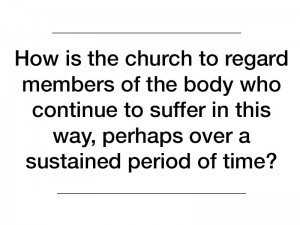“What use could God possibly have for a soul that has been completely emptied?” This question encompassed my reflections back in 2011, a darker season of my years-long struggle with depression. Even now, although I would not frame the question in such a hyperbolic sense, it continues to haunt me. On one level, I still perceive my depression as a particular kind of brokenness—a brokenness that has often given me pause to reflect upon who I am as an individual. More broadly, though, I consider what implications this raises for my participation in the body of Christ.
 Before I am accused of painting a negative portrait of the subject at hand, I must first clarify that I am not suggesting that brokenness is tantamount to sin, as I have been fighting this notion for several years in my own life. To provide rather extreme examples, I have personally been told by others that I suffer from depression because I have too much sin in my life; that mental illness is a form of demon possession; that depression is merely a sign of a spiritual deadness. Rather, here I associate depression with brokenness in that it disrupts God’s design for human flourishing.
Before I am accused of painting a negative portrait of the subject at hand, I must first clarify that I am not suggesting that brokenness is tantamount to sin, as I have been fighting this notion for several years in my own life. To provide rather extreme examples, I have personally been told by others that I suffer from depression because I have too much sin in my life; that mental illness is a form of demon possession; that depression is merely a sign of a spiritual deadness. Rather, here I associate depression with brokenness in that it disrupts God’s design for human flourishing.
In light of these considerations, I instead want to assert that my personal questions are not completely foreign to the church’s uncertain response to mental illness. Furthermore, how is the church to regard members of the body who continue to suffer in this way, perhaps over a sustained period of time? While I do not intend to present a full indictment of the church on this account, I do wish to indicate a lack of consensus as to how to regard mental illness. In viewing some of the contemporary evangelical responses, I was somewhat astonished by the wide and varied perspectives represented in popular Christian forums. A 2009 issue of Christianity Today featured multiple articles on the contemporary “depressive epidemic.” These articles recognized the perplexing nature of depression within the church, ultimately finding root in meaningful suffering, communion in the body of Christ, and Christian eschatology. On a different end of the spectrum, Focus on the Family published an article, as a part of a series, with a rather telling title: “Depression: Reject the Guilt, Embrace the Cure.” While author Bruce Hannigan clarifies that depression is not in itself a sin, he describes the illness as a propensity that may lead to sin if one indulges in it, comparing depression to alcoholism.
In the midst of these assessments, some helpful and some harmful, I believe it is very much important to maintain the complexities of mental health (especially the often-neglected biochemical levels) as the church continues to struggle in better understanding these issues. Even considering the numerous differing responses among Christians, I remain hopeful that the church may increasingly recognize these complexities and thus better support and affirm those who are battling mental illness.
In returning to my initial question, I want to assert that, in the midst of brokenness, God is redeeming all things to himself. This remains a promise, not a trite solution. It is a promise that implies both a continuing process and an eschatological hope. It does not explain away our present trials; it does not silence our questions. Rather, I trust that it gives us cause to boldly pursue our calling to uphold one another in the body of Christ.
